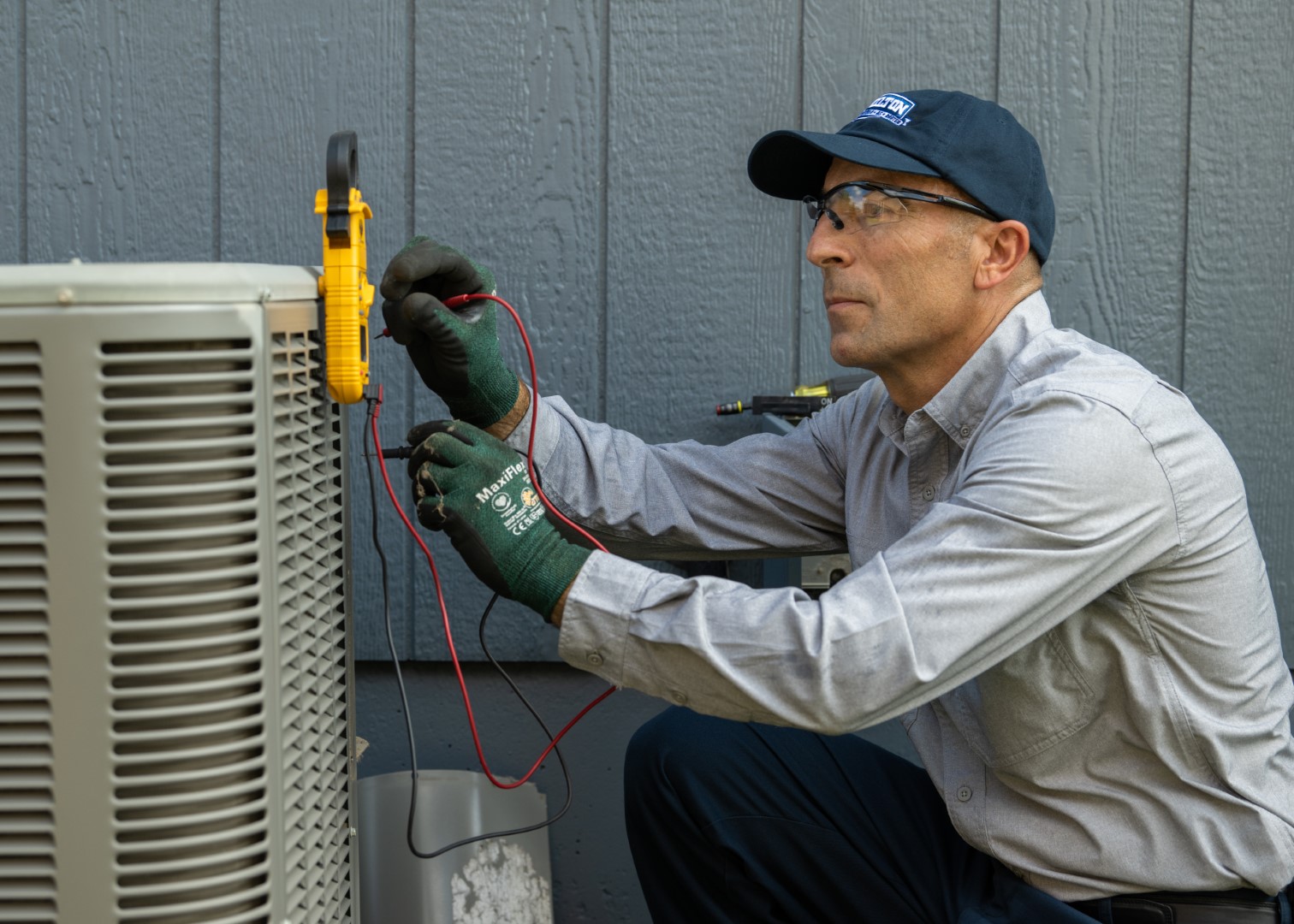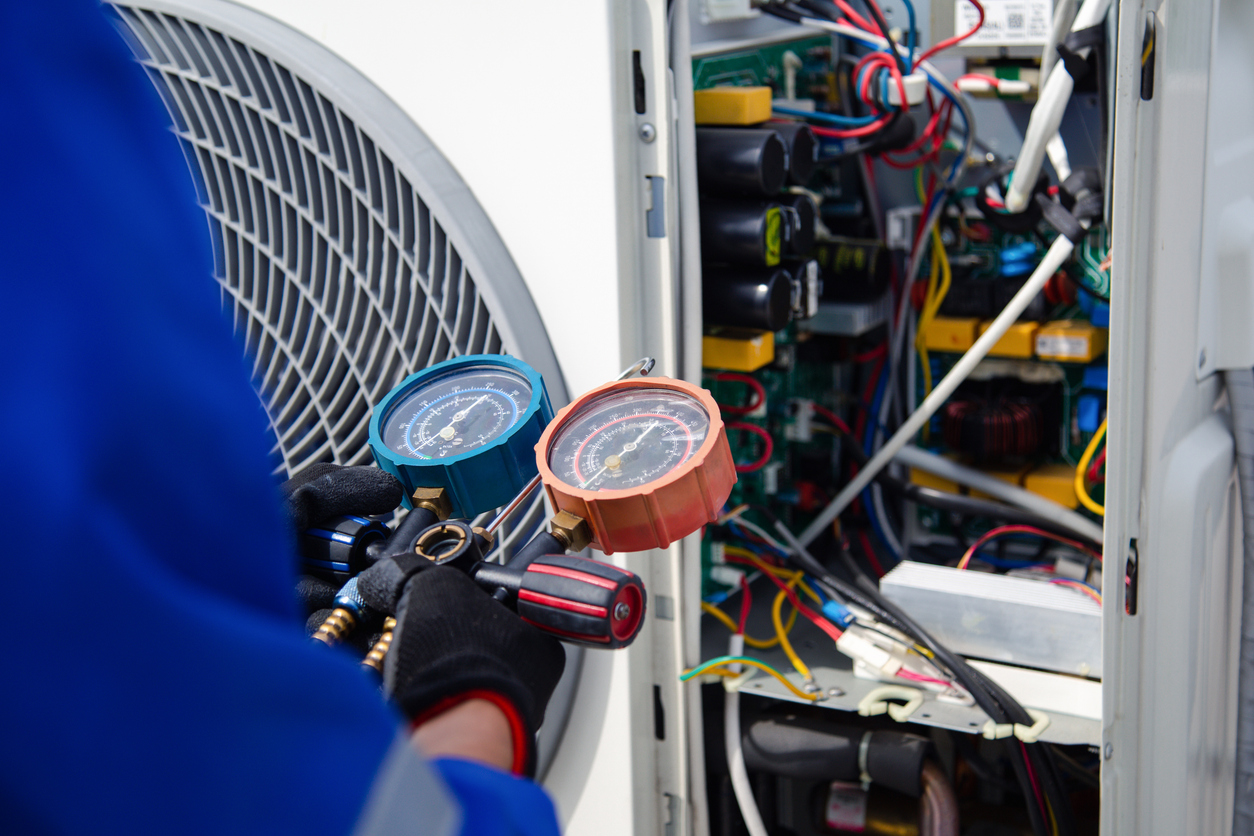Everything about Heating And Cooling: Identifying Common Issues and Effective Air Conditioner Repair Work Techniques
HVAC systems are crucial for maintaining interior comfort. Comprehending their elements and performance is important for determining usual concerns. Property owners usually deal with problems such as ineffective air conditioning, odd odors, or rising power costs. These indicators can show underlying concerns that might call for interest. Discovering do it yourself troubleshooting techniques can be helpful, but knowing when to seek specialist help is just as crucial. What steps can be required to ensure long-lasting efficiency?
Understanding Your Cooling And Heating System: Elements and Performance
A cooling and heating system, usually considered the foundation of interior environment control, consists of several vital elements that interact to manage temperature and air top quality. The primary elements consist of the home heating device, air flow system, and air conditioning unit. The home heating device, commonly a heating system or boiler, creates heat throughout cooler months, while the cooling unit cools indoor areas throughout the summer season.

Usual Cooling And Heating Problems Property Owners Experience
House owners frequently encounter numerous common heating and cooling troubles, including irregular temperature level distribution throughout their living rooms. Furthermore, unusual noises throughout procedure can indicate underlying problems that call for attention. Attending to these issues immediately is important for preserving suitable system efficiency.
Irregular Temperature Level Circulation
Several houses experience the irritating issue of inconsistent temperature level circulation, where certain spaces really feel annoyingly warm while others continue to be also cool. This issue usually occurs from a selection of elements, including poor insulation, blocked vents, or an improperly sized cooling and heating system. When ducts are not sufficiently sealed or when furniture obstructs airflow, some rooms might obtain inadequate air conditioning. Furthermore, thermostat placement can considerably affect temperature policy; a thermostat located in a sunlit location may misstate the overall temperature level of your home. Normal upkeep, including cleansing filters and guaranteeing ductwork is clear, can assist reduce these discrepancies. Home owners might also think about zoning systems to much better control temperatures throughout various areas of the home, promoting a much more comfortable living environment.
Unusual Noises During Operation
When a heating and cooling system operates, uncommon noises can show underlying issues that require focus. Property owners might experience a variety of noises, such as grinding, squeaking, or hissing. Grinding noises typically signal worn-out bearings or components, while squealing can suggest loosened belts or parts requiring lubrication. Hissing may show a cooling agent leak, which can compromise the system's efficiency. In addition, banging audios might indicate loose ductwork or a problem with the blower fan. Each of these noises functions as a caution, prompting homeowners to explore further. Neglecting these indicators can lead to more considerable troubles and costly fixings. Routine maintenance and punctual focus to unusual noises can enhance system durability and performance, ensuring a comfortable living environment.
Indications That Indicate Your Air Conditioner Needs Repair Work
How can one tell if their cooling device requires fixing? A number of indicators may indicate underlying concerns calling for professional focus. First, if the air conditioner fails to cool the space effectively, it might suggest a cooling agent leakage or compressor breakdown. Furthermore, a rise in energy bills without corresponding usage adjustments might signify inefficiency in the system. House owners ought to likewise look out to unusual smells rising from the unit, which might indicate mold development or electric issues. If the Air conditioner often cycles on and off, it could be an indicator of a defective thermostat or other mechanical troubles. The existence of water pooling around the system can indicate a stopped up drainpipe line. Identifying these indicators early can conserve money and time, ensuring that the cooling system operates successfully and properly.
Do It Yourself Troubleshooting Techniques for HVAC Issues
When dealing with heating and cooling issues, property owners can employ numerous do it yourself troubleshooting techniques to recognize the issue. Key techniques consist of inspecting thermostat setups, checking air filters, and evaluating water drainage issues. These steps can assist determine usual breakdowns prior to seeking specialist support.
Checking Thermostat Settings
What steps should homeowners require to assure their thermostat setups are appropriate? Initially, they need to confirm the thermostat is set to the preferred temperature level and mode, whether heating or air conditioning. Examining for a clear screen and verifying the thermostat is not established to "hold" or "getaway" mode is vital. House owners need to likewise confirm that the thermostat is degree and installed in an area devoid of drafts, direct sunshine, or various other temperature affects. Additionally, rectifying the thermostat can assist provide exact analyses. If the thermostat operates on batteries, replacing them might deal with any kind of issues. By methodically assessing these elements, homeowners can often recognize and rectify thermostat-related problems, advertising optimal a/c system performance.
Inspecting Air Filters
Air filters play a vital function in maintaining excellent a/c efficiency. They catch dust, irritants, and other bits, ensuring tidy air circulation. Over time, filters can become clogged up, minimizing air flow and efficiency. To inspect air filters, individuals ought to initially situate the filter, typically found in the return air duct or near the heater. As soon as located, they ought to assess the filter's condition-- if it shows up filthy or blemished, it likely requirements replacement. Many filters require transforming every 1-3 months, depending on use and environmental elements. Normal evaluation and timely substitute of air filters not just boost air high quality yet also extend the life-span of a/c systems, protecting against potential malfunctions and expensive repair work.
Evaluating Drain Issues
Just how can home owners effectively identify and deal with drainage problems within their a/c systems? First, they ought to evaluate the condensate drain line for obstructions or clogs, which can lead to water build-up. Home owners may use a wet/dry vacuum cleaner to get rid of any type of debris obstructing the line. Next, examining the drain pan for rust or leakages is essential, as a harmed frying pan can create water to overflow. Regular cleaning of the Go Here drainpipe line with a see this site mix of vinegar and water helps avoid future blockages. Furthermore, making sure correct incline of the drain line advertises effective water circulation. If these DIY strategies do not fix the concern, getting in touch with an expert heating and cooling service technician might be required to avoid potential water damage and system failing.
When to Call a Professional for A/c Fixings

While some a/c problems can be dealt with via do it yourself methods, there are situations where calling a professional becomes crucial. Homeowners need to look for skilled assistance when they experience persistent problems, such as poor cooling, odd sounds, or unusual smells rising from the unit. These signs might suggest deeper issues that require specialized knowledge and tools to identify and repair appropriately.

Preventative Upkeep Tips for A/c Durability
Regular preventative upkeep can significantly boost the durability of HVAC systems. Property owners ought to schedule yearly examinations by qualified professionals to evaluate system efficiency and determine prospective problems. Regularly transforming or cleaning air filters is vital, as this guarantees proper airflow and reduces stress on the system. In enhancement, checking and securing ductwork avoids energy loss and boosts total performance.
It is likewise recommended to maintain the exterior device free from debris and greenery, permitting peak air movement and heat exchange. Property owners ought to check the condensate drain for obstructions to stay clear of water damage and mold growth. Furthermore, preserving suitable thermostat settings and using programmable options can enhance energy efficiency. Recording upkeep tasks helps track solution background and can help in determining recurring issues. By complying with these preventative actions, individuals can maximize the performance and life expectancy of their a/c systems
Regularly Asked Questions
Just how Frequently Should I Change My Heating And Cooling System Filters?
HVAC system filters should normally be changed every one to 3 months, relying on usage, filter kind, and environmental aspects. Regular substitute aids keep efficiency and air quality, making certain peak system efficiency throughout the year.
What Size Heating And Cooling System Do I Required for My Home?
To figure out the proper HVAC system size for a home, one have to think about square footage, insulation top quality, and regional environment. Consulting a professional can help assure maximum performance and comfort for the specific living space.
Are There Eco-Friendly HVAC Options Available?
Yes, eco-friendly cooling and heating alternatives are available, including energy-efficient warm pumps, solar-powered systems, and geothermal home heating. These choices lower power usage and ecological impact, advertising sustainability while maintaining efficient environment control for residential and commercial rooms.
Just How Can I Improve My cooling and heating System's Energy Performance?
To enhance HVAC energy performance, one can routinely keep the system, seal air leaks, set up programmable thermostats, utilize energy-efficient filters, and warranty appropriate insulation throughout the home to reduce power usage and boost efficiency.

What Is the Ordinary Life Expectancy of a Heating And Cooling System?
The average lifespan of a cooling and heating system commonly varies from 15 to 25 years, depending on variables such as maintenance, use, and the high quality of setup. Routine upkeep air conditioning contractors in india can significantly expand its functional longevity.
Verdict
In summary, a thorough understanding of heating and cooling systems empowers home owners to recognize common issues and address minor issues successfully. Recognizing signs of breakdown, utilizing do it yourself repairing strategies, and prioritizing normal upkeep can improve system performance and performance. Nonetheless, when faced with intricate repair work, getting specialist aid is critical to assure security and longevity. By fostering recognition and proactive treatment, individuals can appreciate a comfy indoor environment while reducing unexpected prices linked with a/c failures.